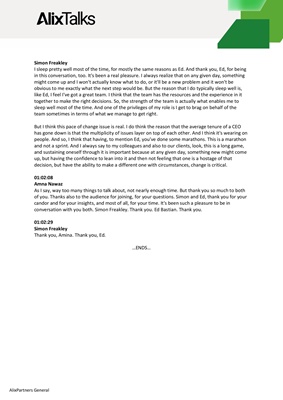
rewards. And so, as they try to make sure they don't end up not honoring a sanction requirement, or
not allowing bad actors to move money through their network, or not applying the established
processes, they want to make sure that they don't fall foul of those tests, cross those hurdles. And so
they're likely, I think, to hold off using generative AI, certainly open source, generative AI
capabilities, until all of the protocols are in place. So, I think you'll see financial services being a slow
adopter in this respect. I think once the large language models can operate behind firewalls, and so
there's no sharing or potential of sharing of information open source, then I think it becomes easier.
So, to the specific question, I would say that general councils of financial services businesses are
actually displaying good judgment by taking it slowly, because getting it wrong could result in a
calamitous fine or worse to the company.
57:01
Amna Nawaz
Michael, anything you'd add to that?
57:03
Michael Kratsios
I think that's right. I think we talked a little bit about sort of taking a risk-based approach to selecting
your use cases, and I think this applies directly to this issue.
57:11
Amna Nawaz
So, we've only got a couple minutes left, but I'd love if each of you would kind of leave us with a
specific example. As we know, this is not a revolution that's coming. It's one we are in and very much
living through. So, in terms of the customers you work with, business leaders you're talking to, could
you give us one specific example of where AI is being adopted and implemented successfully, and
what benefit it's bringing to that corporation right now? Simon, would you like to start?
57:37
Simon Freakley
Let me give you a real example that happened in the last couple of months. One of our clients is a
manufacturer of quite a sophisticated product requiring many electronic components, and asked us
whether we could suggest a way to make this product in a more cost beneficial way. We have these
tear down labs at our firm where we will take things right down, literally, to their basic molecules, to
understand composition and then rebuild them. And so, in this particular case, we took the product
to a tear down lab. Six consultants spent two weeks tearing this product apart, right down to its
basic structures and components, and then proposed a solution where a product at least as good
from a quality point of view, could be produced at a 20% discount to its existing cost.
Before we sent that response to our client, we then asked ChatGPT the question, and this is a well
known public product, so it wasn't as if were putting anything on the open source network that was
at all proprietary. We asked the same question. Within three minutes, ChatGPT came back with
answer that was 98% as good. It wasn't completely perfect, but it was 98% as good. And so, you start
to think, well, actually, if you'd started off with the ChatGPT answer and then searched for the 2% or
more, that could be improved, it would make for a very different consulting experience. So, that's a
real example.
59:03